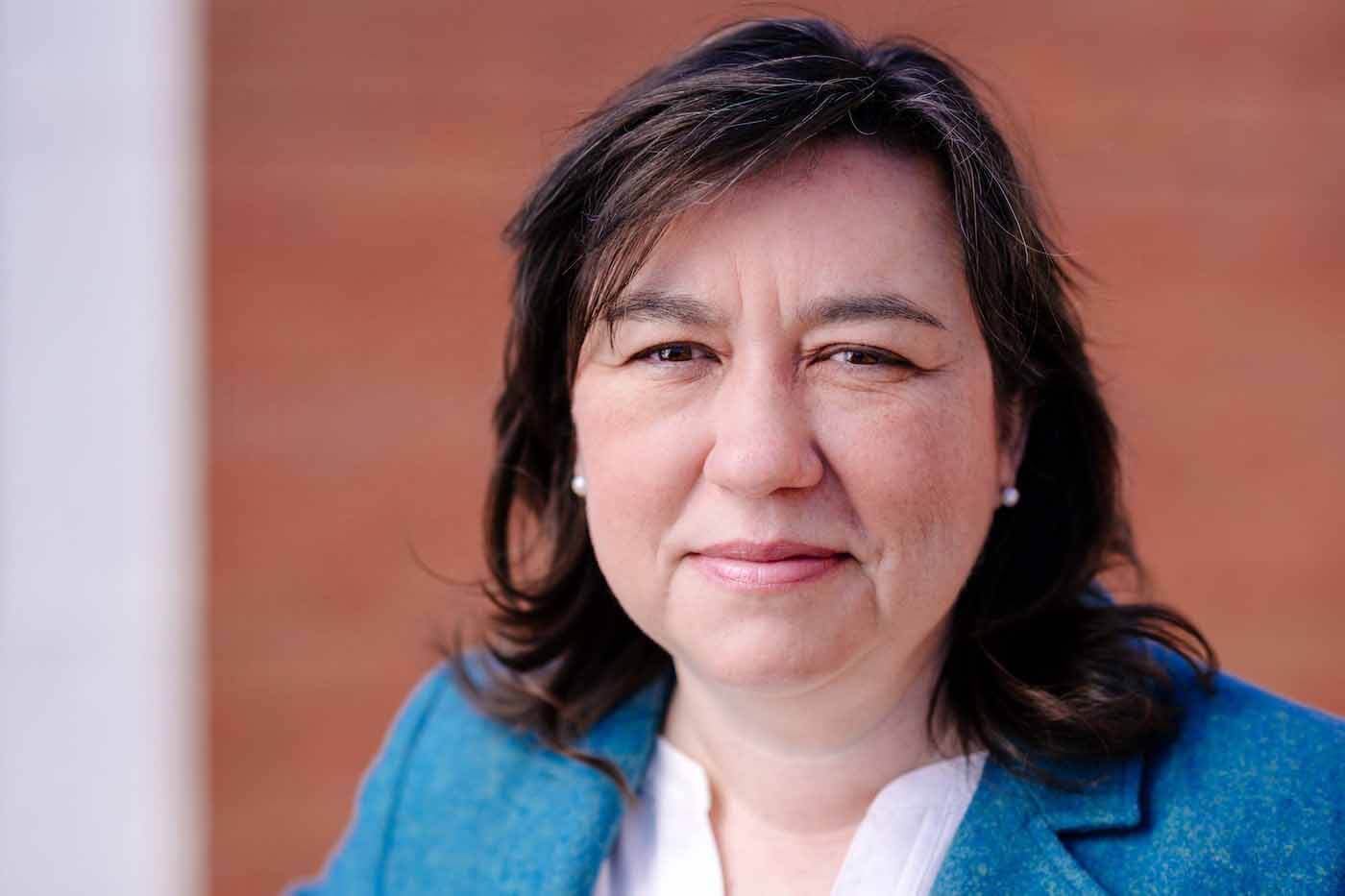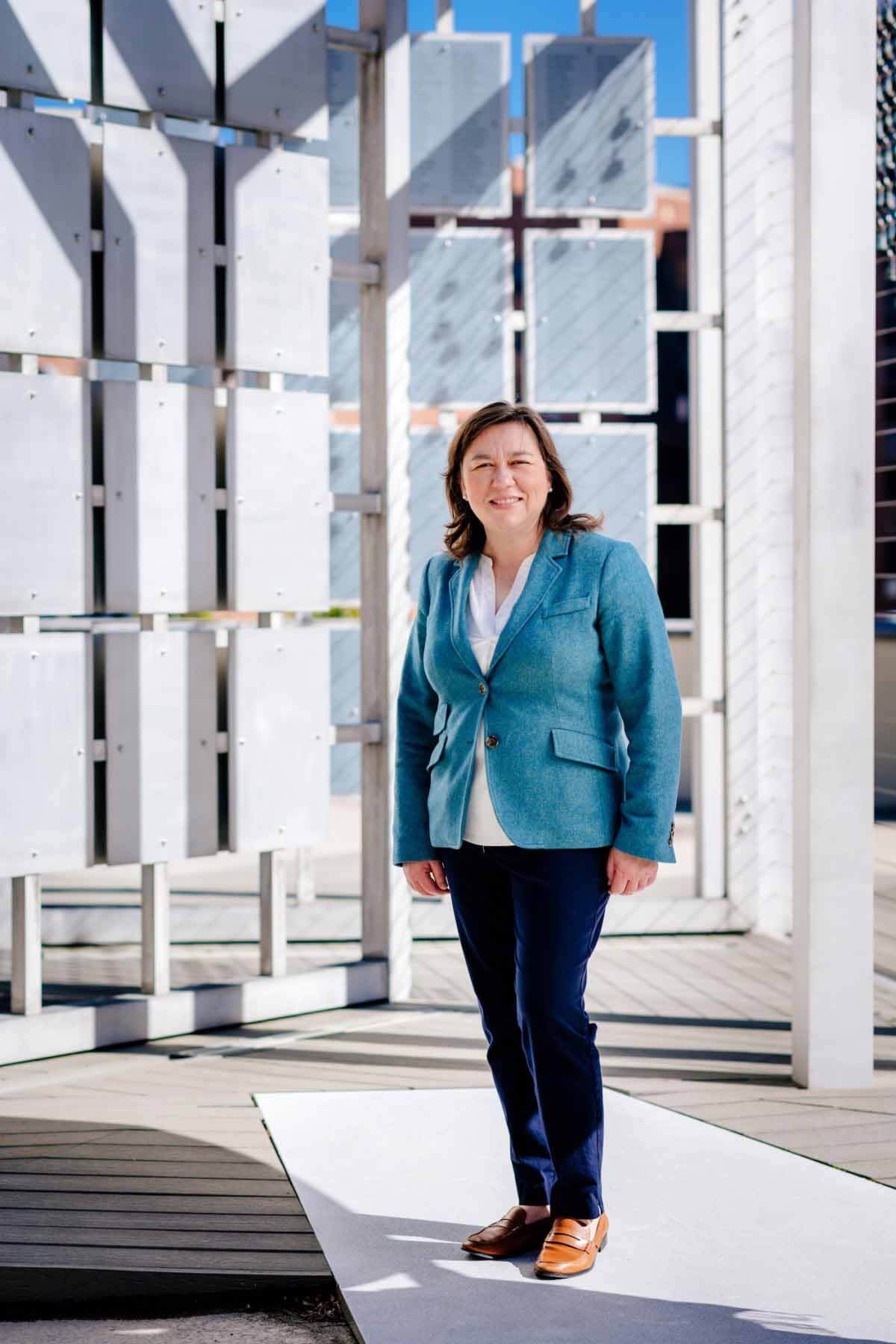Sarah Nafziger, M.D., MSHA, has dedicated her life to disaster medicine. She studied bioterrorism and had boots on the ground during the Ebola outbreak. And as Vice President of Clinical Support Services at UAB Medicine, she has a hand in all aspects of disaster response, from ongoing COVID-19 strategies and initiatives to patient flow, employee health, and even leading UAB’s massive rollout of the vaccine. She’s a true hero, but she’d tell you it’s her team (the administrators, doctors, nurses, and staff) who impress her so much. Meet Sarah Nafziger, our newest FACE of Birmingham.

What inspired you to pursue a career in medicine?
I’m one of those lucky people who knew exactly what they wanted to do from the time they were a small child. I always was interested in and loved medicine. Ever since I arrived at UAB, I just fell in love with it, and I have never left — it’s home for me. I love the people here, I love the things that we get to do here every day, and I just feel privileged to be a part of it.
Why specifically disaster medicine?
I started off thinking I would do family medicine and might return to rural Alabama, but frankly, I liked the academic medicine, and I’m a little bit of an adrenaline junkie, so I ended up switching my specialty to emergency medicine — it was just a better fit for me. So, as I began down the pathway of emergency medicine, I was given the opportunity to work on a grant for bioterrorism awareness training, and during that fellowship, we were actually in New York on 9/11 for a research meeting. That was really a galvanizing moment for me. We were out in the street in the ash and smoke, and a senior emergency medicine physician from another academic medical center turned to me with this truly alarmed look in his eyes and said, “Do you think there could be anthrax in this ash?” I thought about the question for a moment and said, “No, and I’m going to tell you why.” And I really liked being the person who knew the answer to that question and who could provide some calm in the chaos. I knew then that this is something I wanted to do for the rest of my career.
I was at the Alabama Department of Public Health when Ebola happened, so I got to work through Ebola and see it from both the hospital response side and from the regulatory side. Then as the co-chair of UAB’s Emergency Management Committee, we prepare for and lead all disaster responses, and I was the medical director for employee health when COVID started — if you read my CV, it looks like I was preparing myself for a pandemic. I was poised to help lead the response, and I’ve just been really privileged to be able to do that and work with such a great team of people every day.

What was your reaction when you learned about COVID? No one wishes for a pandemic, but was there a part of you a little eager to put your skills to work?
You know, maybe it’s something like being a football player on the sidelines when the coach calls your name to go into the game — that’s kind of how I felt. I definitely saw it coming. I remember it very clearly. It was New Year’s Day 2020 … I woke up and was looking at the news on my phone, and I remember reading about the virus out of Wuhan, China, and I said, “Uh-oh, we have a big problem.” That’s one I hated to be right about, but within a week or two, we were already deeply engaged in response.
Tell us a little bit about the vaccine rollout.
The vaccine rollout has been tremendously emotional for a lot of people and for us, definitely. People are eager to receive the vaccine. A huge priority for us is making sure that people are treated equitably. We want to be fair in our distribution; we want to follow the rules of public health and be as efficient as possible in getting shots in arms. So those things have really guided our decision-making strategy for how we roll out the vaccine. I’m humbled to see the caliber of people that I work with every day — it’s unbelievable the things that they can get done in a short period of time.
Have you had to throw away any vaccines?
We have not had to waste a single dose, and I’m so grateful for that, but it has taken significant maneuvering on our part to make sure that is the case. These vaccines have very strict handling and cold-storage requirements, so we’ve had to be very creative and really micromanage this process to make sure that we don’t accidentally waste a dose.

Okay, the million-dollar question: When will we get back to normal?
I don’t know the answer to that question, but I know this: Every person that we vaccinate is one more person who is less likely to have severe disease and require hospitalization and less likely to have a case at all. So, every person we vaccinate gets us one step closer to that goal. How long is it going to take? Nobody knows because nobody knows how quickly they’re going to get delivered to us so that we can put shots in arms.
What is most challenging about your work?
The most challenging thing is having to overcome shortages of things when you really need them, and that’s been true during the pandemic. We’ve had to overcome shortages of N95 masks, medications, needles, gloves, gowns — so many things that we’ve had to overcome. That has really been a challenge for our team to deal with because when you have to go to alternative sources and use different supplies that we’re not used to using, it’s a lot of work. Can we do it? Yeah, but it just adds an extra layer of work for everyone, and then it makes people anxious. Most of those things that we’ve been short on are things that we need to take care of patients. So what I worry about is the mental health, physical health and well-being of our healthcare providers. I am responsible for employee health, so I’m worried about our healthcare providers becoming infected and becoming ill or even dying. That’s the thing that keeps me up at night, worrying that they’re going to be contaminated because they don’t have proper protective gear or worrying that they’re going to be upset because they couldn’t take care of a patient because we didn’t have the right medication. I worry about our healthcare providers and making sure that they’re not only physically safe but that they’re psychologically safe. I think the pandemic has taken a huge psychological toll on everyone, but especially on those who work in healthcare. I think we’re going to see the consequences of that for years to come, and we don’t have a great strategy to deal with that. Taking a few days off is not going to cure it. It’s going to take a long time.
What’s most rewarding in your work?
When you look at our vaccine sites, it’s the happiest place on earth. Everybody’s so excited to get their vaccine. You see all the work everyone put into making those sites work well. It really is very rewarding — that gives me the boost I need to get up and come to work every day.

What do you like to do when you’re not working?
I don’t remember. [Laughs] My family enjoys going outside. We go hiking a lot, we backpack, we play lacrosse, and just have fun goofing off out in the yard with our labs, Leroy Jenkins and Andy Dwyer.
Proudest accomplishment?
Well, professionally, just making it through COVID so far — it’s been a tremendous challenge for me, but I’ve also relished it because I feel like my entire career has prepared me for this moment, and I feel like this was the time for me to step up and shine. All the work that I’ve put in preparing for something like this was time well spent. I’m proud of our team, and I’ve been honored and humbled to be able to lead our COVID response.
What is your best piece of advice?
Don’t give up on yourself. Don’t doubt. Believe in yourself. I’ve had a few times in my life where I had to really get past self-doubt and just move ahead. If I had let self-doubt get in the way, then I would have wasted a lot of time, and I wouldn’t be where I am today. So, don’t doubt yourself.
What are three lighthearted things you can’t live without?
I love kayaking. I also like to have my takeout for dinner. I am not a chef, and having takeout options from all the wonderful restaurants we have in Birmingham is a lifesaver for me. And the time period when restaurants were all closed — oh, that was rough times for me, dark days! One of the keys for me to keep my sanity during COVID is listening to music … that’s been a huge part of me maintaining my mental health.
Thank you, Sarah! Photography courtesy of UAB News.
**********
Meet more inspiring people, discover new travel destinations, find delicious recipes and more! Subscribe to StyleBlueprint.



















